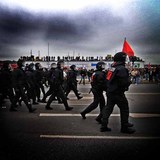
2009-07-05
By Ben Trott
Next week, the eyes of much of the world’s media will be focussed on L’Aquila, Abruzzo, for the 35th G8 Summit. Responses to the current global economic crisis will be high on the agenda. As ever, protests are expected – albeit unlikely of the international order often seen over the last decade.
Eight years ago, the breadth, scale and militancy of the Genoa G8 protests, as well as the police’s brutal reaction, garnered global coverage. The event formed part of a global cycle of struggles that included protests against other summits elsewhere in the world, as well as simultaneous demonstrations during the Genoa Summit itself. Since the turn of the Century, millions have taken to the streets against the doctrine of neoliberalism – a programme of privatisation, deregulation and financialisation – with the claim that ‘another world is possible’.

With the current crisis of neoliberalism, however, the alter-globalisation movement would appear to have reached an impasse. Whilst there may well yet prove to be large numbers who take to the streets across Italy next week, the global nature of the protests that has previously characterised similar events will largely be absent. This is the case both in terms of those expected to make their way to Italy, as well as demonstrations organised to coincide with the protests elsewhere in the world.
In Germany, two demonstrations are planned. One will be held in Berlin on Saturday July 4, before the G8 Summit. It is being called for by a number of radical left groups and seems likely to be relatively small. The other is an anti-capitalist demonstration planned in the southern German university town of Freiburg for Saturday 11, the day after the G8 Summit. None of the larger networks or organisations of the left and radical left have shown much interest in a mobilisation of any kind. Attac Germany, who played an important role in the mobilisation to Genoa and the 2007 G8 protests in Heiligendamm, do not even mention the L’Aquila Summit in their latest e-newsletter (although, interestingly, they did mobilise to the G20 protests in London in April). Nor is information to be found anywhere prominent on their website. The Interventionist Left, a radical left network central to the organisation of the Heiligendamm protests, are not coordinating a mobilisation either. The German Indymedia web-portal contains little mention of the planned protests – and none of the few articles which do exist have been given much prominence by the site’s editors.
In theory, now would seem to be an opportune moment for a large mobilisation of the European left against the Summit. The raison d’être of the G8 has always largely been facilitating responses to the crises that confront global capitalism. It was established in 1975 as the G6 (then without Canada or Russia) following two major events that seriously threatened global political economic stability. The first was the 1971 collapse of the Bretton Woods system, through the deregulation of currency markets and the un-pegging of the dollar from the gold standard. The second was the oil price shock of 1973. The goal of the founding meeting, and those which have followed annually, was the informal forming of consensus amongst the member states, primarily in relation to international economic restructuring. (Other issues have since also become important). The fact that the G8 states hold 48% of the votes within the IMF, 46% in the World Bank, and four out of five veto-holing seats on the United Nations Security Council gives the agreements they form considerable meaning.
Perhaps part of the reason for the lack of an international mobilisation around this year’s Summit is due to the difficulties the European left is facing, including in Germany, in terms of developing an adequate response to the current crisis. Recent demonstrations organised around the slogan, ‘We won’t pay for their crisis’, have been unable to mobilise beyond the traditional constituencies of the left, despite the considerable breadth of the organising coalitions. The attac network has failed to gain much social relevance despite (or perhaps even because of) neoliberalism’s deep crisis. Despite the perceived success of the Heiligendamm protests, the autonomous area of the German radical left has failed to grow in size over the last two years. And the new Left Party failed, by a considerable degree, to achieve its stated goal of 10% at the recent EU elections.
The as yet unanswered questions which currently confront the alter-globalist left in Germany and beyond, then, are as follows. Firstly, what kind of (antagonistic) relationship will it have to the international institutions and forums – including the G8 but also the newer G20 which includes several ‘emerging economies’ – that will likely play a key role in forming responses to the current crisis? When and where will this be articulated? Secondly, in which ways, if at all, will this left be able to develop common practices and forms of cooperation with struggles that erupt elsewhere in society? And thirdly, to what extent will the dynamic between them be able to effect broader social processes, and what will this mean for the future of the movements?
The term ‘crisis’ implies the necessity for change. Eight years after Genoa, then, we can say with confidence: Another world is entirely inevitable. The question is just, what role will the left play in its creation?
Ben Trott is an editor of Turbulence: Ideas for movement (www.turbulence.org.uk) and is based in Berlin. This article was first published in Italian in Carta, July 3 2009.